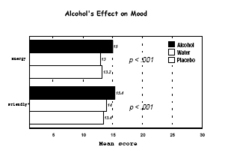Last week’s WAGER (Volume 3, Issue 12) featured an experiment which found that intoxicated individuals perceive negative consequences from risky behaviors as less likely and future participation in these behaviors as more likely than do people who are sober. This week’s WAGER presents a second experiment in this study, which tested the same hypothesis but provided the study participants with more realistic methods for eliciting outcome expectancies about risk taking. The sample of 88 participants averaged 23.5 years of age and drank an average of 11.8 drinks per week. Participants were randomly assigned to drinking either water, alcohol (to BAC 0.08 mg%), or a placebo (decarbonated tonic water + diet 7-up). Via a computer, participants were either shown scenes of people engaging in a variety of risky behaviors (e.g., a college couple drunk in a dormitory room, a physical fight among a group of men, a group of people smoking marijuana at a party) or given written vignettes of the same behaviors. The results reveal that, similar to the first experiment, intoxicated individuals compared to sober individuals perceive negative consequences from risky behaviors as less likely. However, contrary to the first experiment, intoxicated participants compared to sober participants did not report future participation in these behaviors as more likely. Fromme et al. also examined participants’ moods to see if moods affected their outcomes expectancies. Participants felt more friendly and energetic when they drank alcohol as compared to a non-alcoholic placebo or water. However, regression analyses revealed that these mood differences did not effect outcome expectancies or expected involvement in risky activities. Since moods do not influence outcome expectancies, it is a different factor that encourages intoxicated individuals to take more risks than they would if they were sober. These researchers suggest that this factor is the lack of ability to consider the potential negative consequences that may occur as a result of a risky behavior. Similar research on outcome expectancies among gamblers could provide meaningful insight into the development and maintenance of problem gambling. Since there may be a considerable time lag between excessive gambling behavior and its negative consequences (e.g., loss of job or relationship), helping individuals to retain awareness of potential negative consequences regardless of alcohol consumption may be important from a prevention perspective.
Source: Fromme, K., Katz, E., & D’Amico, E. (1997). Effects of alcohol intoxication on the perceived consequences of risk taking. Experimental and Clinical Psychopharmacology, 5(1), 14-23. .
This public education project is funded, in part, by The Andrews Foundation.
This fax may be copied without permission. Please cite The WAGER as the source.
For more information contact the Massachusetts Council on Compulsive Gambling,
190 High Street, Suite 6, Boston, MA 02110, U.S





